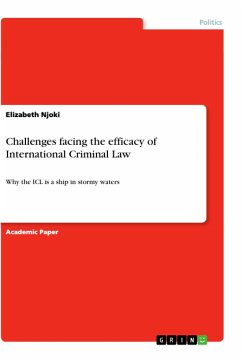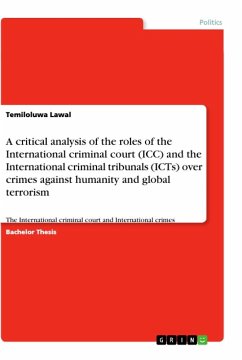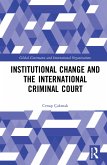Master's Thesis from the year 2012 in the subject Politics - Political Systems - General and Comparisons, grade: 17/20, University of Ghent, language: English, abstract: This dissertation looks into the possibility to expand the International Criminal Court's competence as to include legal persons, through an amendment of the Rome Statute. Examples of corporate involvement in international crimes such as genocide, crimes against humanity and war crimes are numerous.The dissertation is made up out of four parts. Firstly, an evaluation will be made as to whether there exists a genuine need for international criminal liability for corporations. As such, the first part provides an overview of the relevant aspects of the international crimes, a number of examples of corporate involvement in international crimes and a description of the existing regimes of accountability. Additionally, some counterarguments presented by relevant learned authors will be evaluated.Secondly, an assessment of the current feasibility of the concept is made, after careful consideration of the obstacles presented at the 1998 Rome Conference, such as the lack of an international standard in corporate criminal liability and the propriety of the existing sanctions. A third hindrance, the attribution of mens rea to corporations, will form the focal point of the third and most important part of this dissertation.After thorough examination of the four existing models for attribution of mens rea, the author aims to identify the attribution model which not only represents the best legal alignment with the concept of international criminal liability, but in addition is most likely to be politically acceptable for all States Parties to the Rome Statute.Lastly, as most corporate involvement in international crimes takes the form of corporate complicity, the final part of this dissertation will bring to light a number of difficulties inherent to the application of the current phrasing of the concept of participation in article 25 of the Rome Statute to corporate entities.Throughout the pages of this dissertation it will be the attempt to not only present a plea for corporate responsibility for international crimes, but additionally and more importantly, to offer practically workable solutions for the existing legal problems surrounding this subject.
Hinweis: Dieser Artikel kann nur an eine deutsche Lieferadresse ausgeliefert werden.
Hinweis: Dieser Artikel kann nur an eine deutsche Lieferadresse ausgeliefert werden.








